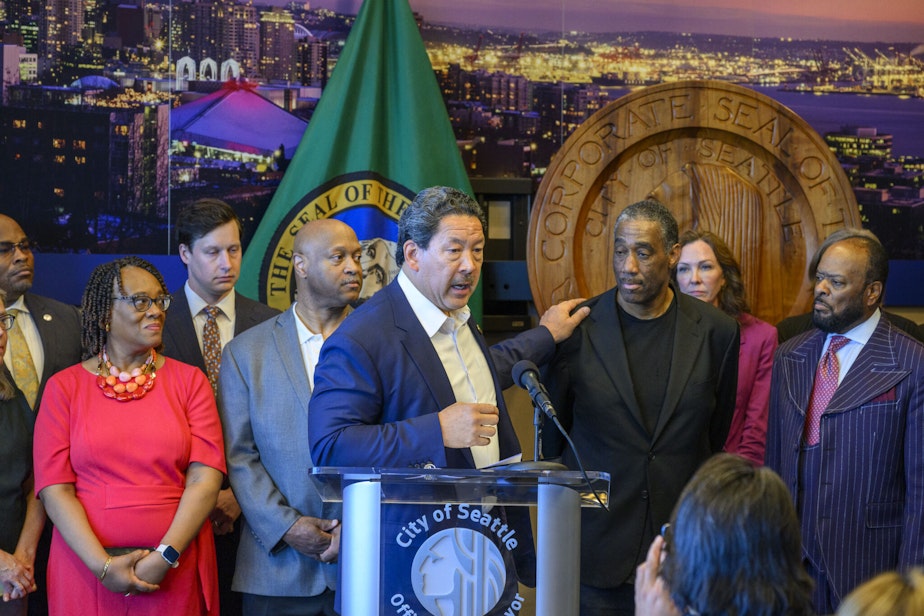Take 2: Workgroup formed to develop new Seattle drug possession law

Seattle Mayor Bruce Harrell, and a team of city and community leaders, plan to go back to the drawing board to bring the city's municipal code in line with Washington state's new drug possession law.
A 24-member workgroup has been formed to develop an ordinance that will align Seattle's local law with state law. (A list of workgroup members can be found below.)
“We are committed to addressing the deadly public health crisis playing out on our streets, holding dealers accountable for trafficking illegal drugs harming our communities, and advancing innovative health strategies to help those struggling with substance use disorder,” Mayor Bruce Harrell said in a statement. “There is a time for appropriate constitutional arrests when people are posing a threat to others; however, when people are a threat only to themselves, they need compassionate treatment. Updating the Seattle Municipal Code to align with recently passed state law makes sense, as does demonstrating how this additional tool will be applied and how it fits in the broader spectrum of treatment and diversion options.”
The state's new law goes into effect July 1. There was a previous attempt to establish a local drug possession law, but the Seattle City Council rejected the proposal last week. That bill proposed to allow the city attorney to prosecute the cases, which are now gross misdemeanors under state law. A majority of council members voted against the idea, citing fears it would lead to more low income and people of color being charged.
RELATED: Finger-pointing and fallout in the wake of Seattle City Council drug law vote
Sponsored
The need for treatment and diversion options for drug possession crimes in Seattle was cited as the reason behind their stance for both proponents and opponents.
In the wake of the council vote, the new 24-member workgroup will aim to develop another ordinance that will include treatment and pretrial diversion options.
According to the mayor's office, the workgroup unites "the four corners of Seattle government — the Mayor’s Office, Seattle City Council, Seattle Municipal Court, and Seattle City Attorney — along with leaders in law enforcement, diversion programs, and service provision, and other subject matter experts to advance effective and sustainable solutions addressing illegal drug use in public spaces."
Included in the workgroup are city officials who were on opposite sides of the previous proposal. City Attorney Ann Davison supported the failed ordinance, along with council members Sara Nelson and Dan Strauss, who voted in favor of the bill. Also in the workgroup are council members Lisa Herbold and Andrew Lewis, who voted against the measure.
RELATED: Seattle City Attorney Ann Davison says she's not leading new 'war on drugs'
Sponsored
“I do very sincerely appreciate the Mayor including my participation in the workgroup," Councilmember Herbold said in a statement. "I hope that, like this letter from more than a hundred doctors calls for, we can focus our efforts on ‘smart, data-proven policy that will achieve our intended goals, not naive, reactive, and harmful policy that repeats the mistakes of the past.'"
“Our current approach to addressing Seattle’s drug crisis is failing and resulting in record overdose incidents and deaths," Councilmember Nelson said. "I’ve been leading with a sense of urgency on this issue and will be pushing for the workgroup’s quick deliberation and action so that we adopt our legislation to codify state law into our municipal code. Together, we can use this tool to better incentivize addiction treatment and reduce the negative health and safety impacts of public drug use.”
Workgroup members:
- Seattle Municipal Court Presiding Judge Faye Chess
- Seattle Municipal Court Judge Damon Shadid
- Seattle City Attorney Ann Davison
- Seattle City Councilmember and Public Safety Committee Chair Lisa Herbold
- Seattle City Councilmember Andrew Lewis
- Seattle City Councilmember Sara Nelson
- Seattle City Councilmember Dan Strauss
- Seattle Police Department Chief Adrian Diaz
- Seattle Fire Department Chief Harold Scoggins
- Civilian-Assisted Response and Engagement Department Chief Reba Gonzales
- Seattle Human Services Department Director Tanya Kim
- Seattle Office of Civil Rights Director Derrick Wheeler-Smith
- Seattle and King County NAACP President Darrell Powell
- Purpose Dignity Action Co-Executive Director Lisa Daugaard
- REACH Director of Community Justice Brandie
- Flood Deputy City Attorney Scott Lindsay
- Criminal Division Chief Natalie Walton Anderson
- SPD Captain Dan Nelson
- SPD Lieutenant Robert Brown
- Seattle Human Services Department Deputy Director Michael Bailey
- Purpose Dignity Action Director of Engagement and Development Fé LopezGaetke
- LEAD Senior Project Manager Sean Blackwell
- REACH Director of Integrated Care Michelle Conley
- LEAD Program Supervisor Devin Majkut




